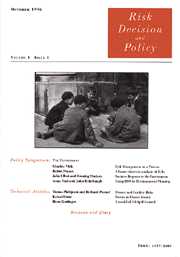Crossref Citations
This article has been cited by the following publications. This list is generated based on data provided by
Crossref.
Smithson, M.
2000.
Uncertainty in the physical, social, and virtual worlds.
p.
1.
Kandlikar, Milind
Risbey, James
and
Dessai, Suraje
2005.
Representing and communicating deep uncertainty in climate-change assessments
.
Comptes Rendus. Géoscience,
Vol. 337,
Issue. 4,
p.
443.
TAKEMURA, Kazuhisa
2005.
Decision Making and Behavioral Decision Theory.
Journal of Japan Society for Fuzzy Theory and Intelligent Informatics,
Vol. 17,
Issue. 6,
p.
646.
Pushkarskaya, Helen N.
and
Alvarez, Sharon
2006.
What Do We Think We Know When We Don't Know Much?.
SSRN Electronic Journal,
Smithson, Michael
2009.
How Many Alternatives? Partitions Pose Problems for Predictions and Diagnoses.
Social Epistemology,
Vol. 23,
Issue. 3-4,
p.
347.
Smithson, Michael
and
Segale, Carl
2009.
Partition Priming in Judgments of Imprecise Probabilities.
Journal of Statistical Theory and Practice,
Vol. 3,
Issue. 1,
p.
169.
Pushkarskaya, Helen
Liu, Xun
Smithson, Michael
and
Joseph, Jane E.
2010.
Beyond risk and ambiguity: Deciding under ignorance.
Cognitive, Affective, & Behavioral Neuroscience,
Vol. 10,
Issue. 3,
p.
382.
Takemura, Kazuhisa
2014.
Behavioral Decision Theory.
p.
3.
Galesic, Mirta
Kause, Astrid
and
Gaissmaier, Wolfgang
2016.
A Sampling Framework for Uncertainty in Individual Environmental Decisions.
Topics in Cognitive Science,
Vol. 8,
Issue. 1,
p.
242.
Takemura, Kazuhisa
2016.
Difficult Relationships between Probability Theory and Science of Risk.
Kodo Keiryogaku (The Japanese Journal of Behaviormetrics),
Vol. 43,
Issue. 1,
p.
1.
Gross, Matthias
2016.
Risk as zombie category: Ulrich Beck’s unfinished project of the ‘non-knowledge’ society.
Security Dialogue,
Vol. 47,
Issue. 5,
p.
386.
Arellano Ulloa, Luis Hernán
Mendoza Meraz, Gerónimo
and
Villarreal Ballesteros, Ana Cecilia
2017.
Handbook of Research on Driving STEM Learning With Educational Technologies.
p.
278.
Smithson, Michael
2018.
Foundations of Trusted Autonomy.
Vol. 117,
Issue. ,
p.
185.
Takemura, Kazuhisa
2021.
Behavioral Decision Theory.
p.
335.
Takemura, Kazuhisa
2021.
Behavioral Decision Theory.
p.
3.
Klingebiel, Ronald
and
Zhu, Feibai
2022.
Sample decisions with description and experience.
Judgment and Decision Making,
Vol. 17,
Issue. 5,
p.
1146.
Müller, Michal
Adámek, Petr
Kotherová, Silvie
Petrů, Marek
Bubík, Tomáš
Daušová, Anna
and
Pelíšková, Leona
2023.
Conceptualisation of Uncertainty in Decision Neuroscience Research: Do We Really Know What Types of Uncertainties The Measured Neural Correlates Relate To?.
Integrative Psychological and Behavioral Science,
Vol. 57,
Issue. 1,
p.
88.
Liu, Di
Sun, Jiangzhou
Ren, Zhiting
Yang, Jiahui
Shi, Baoguo
and
Qiu, Jiang
2023.
The neural basis of acceptance of uncertain situations: Relationship between ambiguity tolerance and the resting-state functional connectivity of the brain.
Current Psychology,
Vol. 42,
Issue. 20,
p.
17033.

